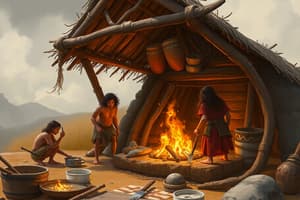Podcast
Questions and Answers
What is the primary characteristic of the Prehistory period?
What is the primary characteristic of the Prehistory period?
- Rise of powerful monarchies
- Existence of written records
- Formation of the United Nations
- Development of early human societies and cultures (correct)
Which period of Prehistory is characterized by the development of agriculture and settled communities?
Which period of Prehistory is characterized by the development of agriculture and settled communities?
- Neolithic (correct)
- Industrial Revolution
- Mesolithic
- Paleolithic
Which ancient civilization developed writing, cities, and empires?
Which ancient civilization developed writing, cities, and empires?
- Ancient Rome
- Feudalism
- Ancient Greece
- Mesopotamia (correct)
What marked the end of classical antiquity?
What marked the end of classical antiquity?
What was the cultural and artistic revival in Europe during the 14th to 17th century?
What was the cultural and artistic revival in Europe during the 14th to 17th century?
What was the transition from manual labor to machine-based manufacturing during the 18th to 19th century?
What was the transition from manual labor to machine-based manufacturing during the 18th to 19th century?
What was the global conflict that led to the formation of the United Nations?
What was the global conflict that led to the formation of the United Nations?
Which period saw the rise of powerful monarchies in Europe?
Which period saw the rise of powerful monarchies in Europe?
Flashcards are hidden until you start studying
Study Notes
Prehistory
- Refers to the period before written records existed
- Characterized by the development of early human societies and cultures
- Divided into three main periods:
- Paleolithic (Old Stone Age): 2.5 million - 10,000 BCE; early humans developed tools and hunted for food
- Mesolithic (Middle Stone Age): 10,000 - 5,000 BCE; development of more complex societies and tools
- Neolithic (New Stone Age): 5,000 - 2,000 BCE; development of agriculture and settled communities
Ancient Civilizations
- Mesopotamia: 3,500 - 539 BCE; Sumerians, Babylonians, and Assyrians developed writing, cities, and empires
- Ancient Egypt: 3,100 - 30 BCE; pharaonic dynasties built pyramids, developed hieroglyphics, and expanded empire
- Ancient Greece: 8th century - 146 CE; city-states like Athens and Sparta developed democracy, philosophy, and theater
- Ancient Rome: 8th century BCE - 476 CE; expanded empire, developed law, architecture, and governance
Middle Ages
- Fall of the Roman Empire: 476 CE; marking the end of classical antiquity
- Rise of Christianity: 1st century CE; spread of Christianity throughout Europe
- Feudalism: 9th - 15th century; decentralized system of governance and economy
- Crusades: 1095 - 1291 CE; series of religious wars between Christians and Muslims
Early Modern Period
- Renaissance: 14th - 17th century; cultural and artistic revival in Europe
- Age of Exploration: 15th - 17th century; European exploration and colonization of the Americas
- Reformation: 16th century; Protestant movement led by Luther and Calvin
- Absolutism: 16th - 18th century; rise of powerful monarchies in Europe
Modern Period
- Industrial Revolution: 18th - 19th century; transition from manual labor to machine-based manufacturing
- Nationalism: 19th - 20th century; rise of nationalist movements and nation-states
- World War I: 1914 - 1918 CE; global conflict that led to the rise of new world powers
- World War II: 1939 - 1945 CE; global conflict that led to the formation of the United Nations and the Cold War
Prehistory
- Refers to the period before written records existed, characterized by the development of early human societies and cultures
- Divided into three main periods:
Paleolithic
- Lasted from 2.5 million to 10,000 BCE
- Early humans developed tools and hunted for food
Mesolithic
- Lasted from 10,000 to 5,000 BCE
- Development of more complex societies and tools occurred
Neolithic
- Lasted from 5,000 to 2,000 BCE
- Development of agriculture and settled communities took place
Ancient Civilizations
Mesopotamia
- Existed from 3,500 to 539 BCE
- Sumerians, Babylonians, and Assyrians developed writing, cities, and empires
Ancient Egypt
- Lasted from 3,100 to 30 BCE
- Pharaonic dynasties built pyramids, developed hieroglyphics, and expanded empire
Ancient Greece
- Lasted from the 8th century to 146 CE
- City-states like Athens and Sparta developed democracy, philosophy, and theater
Ancient Rome
- Existed from the 8th century BCE to 476 CE
- Expanded empire, developed law, architecture, and governance
Middle Ages
- The Fall of the Roman Empire occurred in 476 CE, marking the end of classical antiquity
- Rise of Christianity began in the 1st century CE and spread throughout Europe
- Feudalism was a decentralized system of governance and economy that lasted from the 9th to the 15th century
- The Crusades were a series of religious wars between Christians and Muslims that lasted from 1095 to 1291 CE
Early Modern Period
Renaissance
- Was a cultural and artistic revival in Europe that lasted from the 14th to the 17th century
Age of Exploration
- Was a period of European exploration and colonization of the Americas that lasted from the 15th to the 17th century
Reformation
- Was a Protestant movement led by Luther and Calvin that occurred in the 16th century
Absolutism
- Was the rise of powerful monarchies in Europe that lasted from the 16th to the 18th century
Modern Period
Industrial Revolution
- Was a transition from manual labor to machine-based manufacturing that lasted from the 18th to the 19th century
Nationalism
- Was the rise of nationalist movements and nation-states that occurred from the 19th to the 20th century
World War I
- Was a global conflict that lasted from 1914 to 1918 CE and led to the rise of new world powers
World War II
- Was a global conflict that lasted from 1939 to 1945 CE and led to the formation of the United Nations and the Cold War
Studying That Suits You
Use AI to generate personalized quizzes and flashcards to suit your learning preferences.




